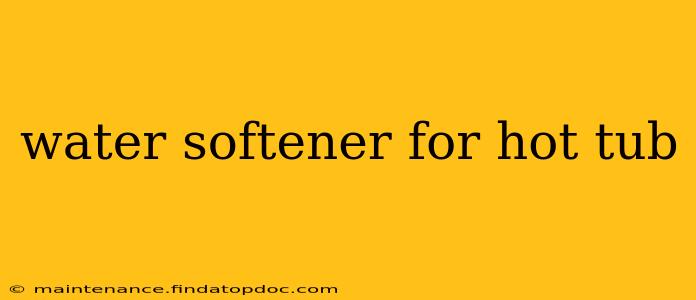Maintaining a sparkling clean and enjoyable hot tub experience requires diligent water care. Hard water, with its high mineral content, can significantly impact your hot tub's longevity and your bathing comfort. This comprehensive guide explores the benefits of using a water softener for your hot tub and answers common questions surrounding this important aspect of hot tub maintenance.
What are the benefits of using a water softener for my hot tub?
Hard water is notorious for leaving behind unsightly scale buildup on your hot tub's surfaces, heater elements, and plumbing. This scale not only diminishes the aesthetic appeal but also reduces the efficiency of your hot tub's heating system, leading to increased energy consumption and potential premature equipment failure. A water softener effectively removes these minerals, preventing scale formation and extending the lifespan of your hot tub's components. Furthermore, softer water feels smoother on your skin, enhancing the overall relaxation and enjoyment of your hot tub experience. Finally, softened water requires fewer chemicals for proper sanitization, leading to cost savings in the long run.
Does a hot tub water softener use salt?
Most hot tub water softeners don't directly use salt in the same way a whole-house water softener does. Whole-house systems utilize salt to regenerate the resin beads that remove minerals. However, hot tub water softeners often focus on other methods of water treatment like filtration or chemical treatments specifically designed to counteract the effects of hard water. This is because introducing salt directly into the hot tub water could lead to other water chemistry imbalances.
How do I soften the water in my hot tub?
There are several ways to tackle hard water in your hot tub, each with its own pros and cons. One method is to pre-treat the water filling your hot tub using a water softener designed for larger volumes. Another option involves using water softening chemicals specifically formulated for hot tubs. These chemicals bind to minerals, preventing them from causing scale and cloudiness. Regular water changes, diligent filtration, and maintaining proper water chemistry are also crucial for managing hard water issues. Always consult your hot tub's manufacturer's instructions for recommended water treatment methods.
What is the best water softener for a hot tub?
There isn't a single "best" water softener for all hot tubs. The ideal solution depends on factors such as the hardness of your water, the size of your hot tub, and your budget. Some hot tub owners opt for whole-house water softening systems that treat all the water entering their home, including the water used to fill the hot tub. Others utilize hot tub-specific water softening chemicals or a combination of both. Consulting a pool and spa professional can provide personalized recommendations based on your specific needs and circumstances.
Can I use a regular water softener for my hot tub?
While you could use water from a whole-house water softener to fill your hot tub, it's generally not recommended. The salt used in these systems can disrupt the delicate chemical balance of your hot tub water, necessitating more frequent water changes and potentially harming the equipment. Moreover, the softened water might still contain traces of minerals that could cause issues over time. Hot tub-specific water treatment products are designed to maintain the correct chemical balance and protect the equipment.
How often should I change the water in my hot tub?
The frequency of water changes depends on several factors, including bather load, the type and frequency of use, and the water chemistry maintenance practices. However, a general guideline is to drain and refill your hot tub every 3-4 months. Regular water changes help mitigate the effects of hard water and ensure a consistently clean and hygienic bathing experience. More frequent changes might be necessary if you notice significant mineral buildup or other water quality issues.
This guide provides a comprehensive overview of water softening for hot tubs. Remember, regular maintenance and proper water treatment are key to extending the life of your hot tub and ensuring a comfortable and enjoyable experience. Always refer to your hot tub's manufacturer's instructions and consider consulting with a professional for personalized advice.
